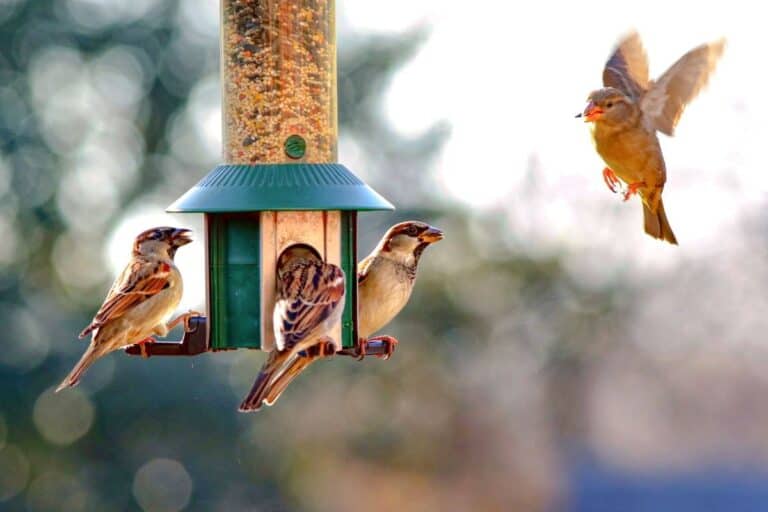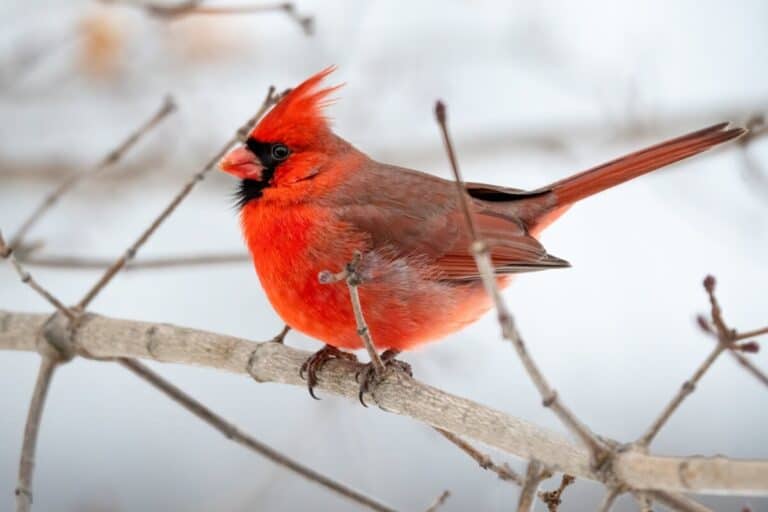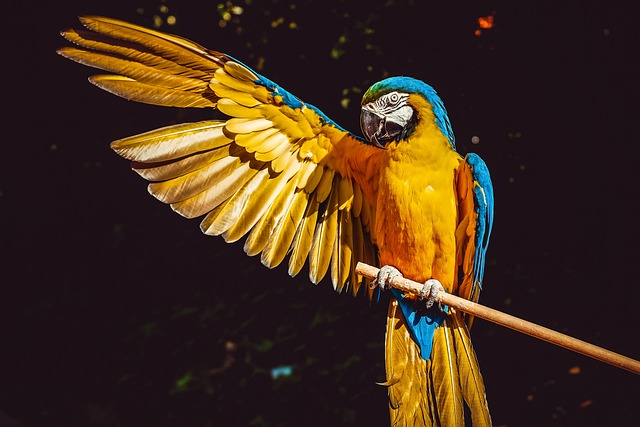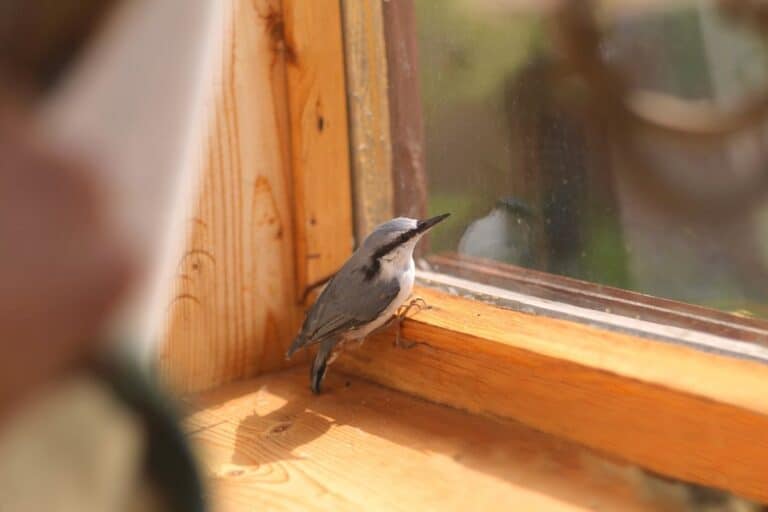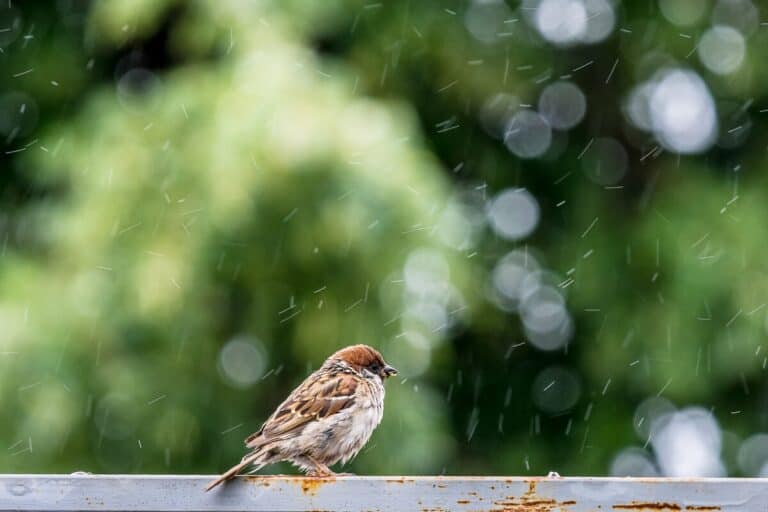Do Birds Get Struck By Lightning? [ANSWERED! + FAQs]
We’re reader-supported; we may earn a commission from links in this article.
I remember looking out my window one day with a huge thunderstorm outside, and this thought crossed my mind: “Do birds get hit by lightning?”
And more curiously, do they survive lightning strikes?
I was so curious about this, so I went to do some research and found an answer.
Here’s what I found:
Birds do get hit by lightning and are often killed by it. Birds that have been hit in the past include geese, blackbirds, starlings, cowbirds, owls, and even pelicans. However, these cases are rare as most birds do not take flight in the rain or in a thunderstorm due to the low barometric pressure.
Now that we all know that birds do get hit by lightning, let’s find out how birds avoid being hit, and also curious cases of news reports of masses of birds being killed by lightning.
Read on!
Bird Lightning Strikes Are Uncommon

Bird populations, like most animals, can sense that a thunderstorm is coming due to the changes in air pressure.
A sensible bird would not begin to take flight when a thunderstorm brings about strong winds, thunder, and lightning.
As birds do not tend to take flight during storms, the likelihood for them to get struck by lightning is low – it’s a relatively rare occurrence.
However, this is not to say that these strikes do not happen!
I’ve compiled a list of instances where birds were reported to be hit and killed as a result of lightning in the news.
Pelicans Hit By Lightning

This incident goes way back to one of the first reports of pelicans being hit by lightning on April 4, 1939, in Nelson, Nebraska.
Based on accounts from a Journal: The Auk, a 14-year-old boy, witnessed a lightning bolt strike within 100 yards in front of him!
At the time, he witnessed the lightning strike a flock of 75 White Pelicans that were flying 100 feet above the ground.
Only one bird managed to survive, and the rest were found dead, and some had their feathers singed.
Blackbirds, Starlings, and Cowbirds Hit By Lightning
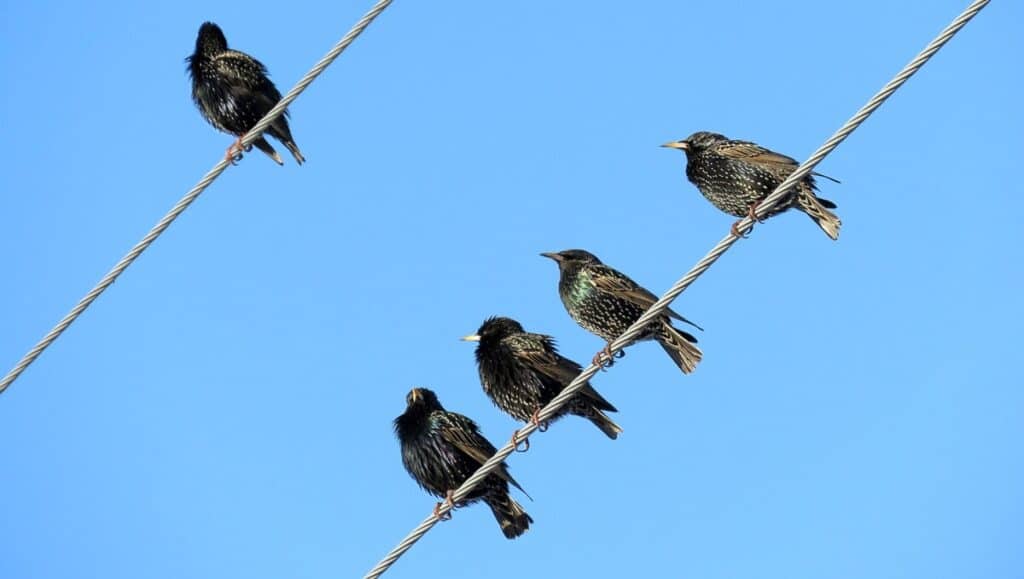
On another account, on March 5th, 2020, an intense thunderstorm was reported to have killed over 1000 birds in Missouri.
Among the birds that were killed were Red-Winged Blackbirds, Brown-Headed Cowbirds, Grackles, and European Starlings.
During the thunderstorm, apparently, some residents have claimed that they heard the thuds of birds hitting the ground while they were at home.
A possible reason why this has happened was that the storm happened at a location that was near a roosting habitat and since these birds are known to be flocking birds, they were killed in large numbers.
However, in this case, there are no clear reports of whether the birds were killed by strong winds or lightning.
Geese Electrocuted Due To Lightning Strike On Water
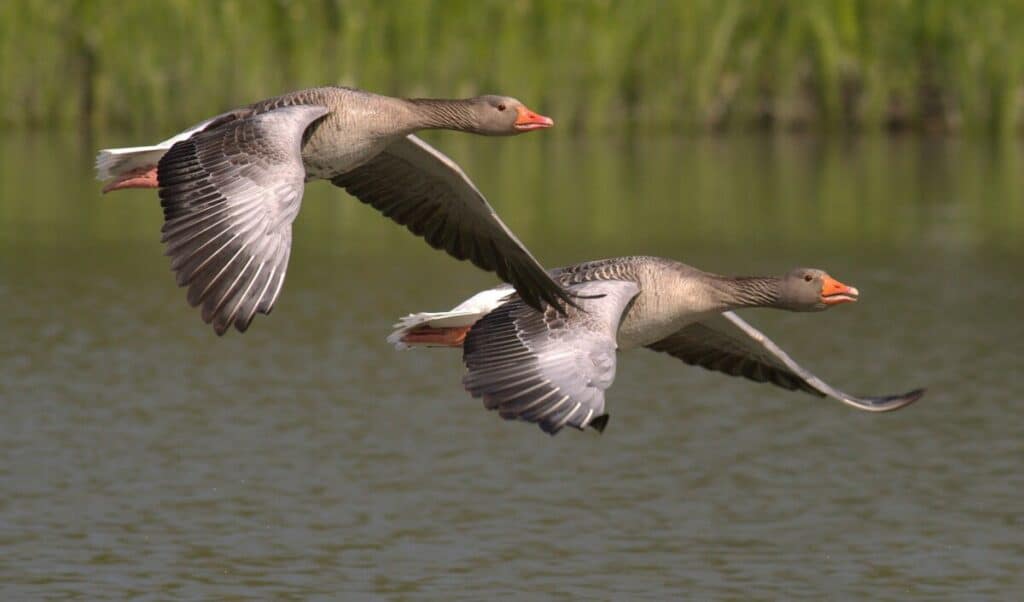
Lightning can not only hit birds while they are in flight but also when lightning strikes water bodies.
In this case, geese have been the victims of many lightning electrocution cases in Montreal, Canada.
50 Canada geese were found dead and floating in a river outside Montreal on June 16th, 2018.
While performing their autopsy, veterinarians have noted lesions in their hearts that could indicate a possible lightning strike.
In addition, the level of decomposition of their carcasses also indicates that they all died at the same time, which ruled out any disease causes of malnutrition.
Experts have concluded that the electricity from lightning had been conducted over a wide area and caused the birds to suffer from burns.
There was also a report of a ‘goose or swan’ being killed by lightning in Welshpool. Here’s a link to the article.
In another case, more than 100 geese were killed on April 7th, 2018 in Idaho near Idaho Falls. The birds were struck by hail and thunderstorms. In other reports, there has been evidence that these geese all fell at the same time, which indicated they had been struck by lightning.
In addition to that, a few of the geese actually had their stomachs blown open, and all of them were reported to be dead. Thankfully these snow geese are abundant and not threatened!
Rare Birds Killed In lightning Strike
In the United Arab Emirates, there has also been a report of 50 rare bird species totaling $5 million that were killed by lightning on a farm in Abu Dhabi.
These birds were worth so much because they had won many trophies in competitions and as the farm’s owner calls “priceless”. This happened on March 25th, 2019.
Owl Barely Survives Lightning Strike On Tree
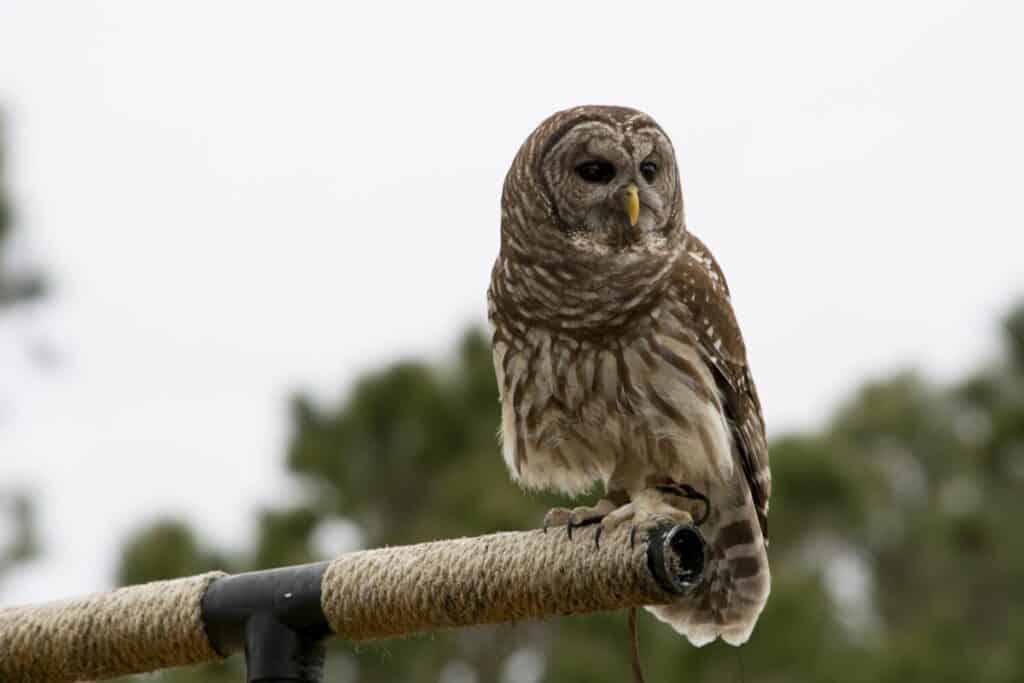
A Barred Owl had been sitting in a tree when lightning struck its tree and suffered from eye trauma and singed feathers.
Thankfully, it didn’t take a direct hit from the lightning itself!
The owl was then admitted to the Raptor Trauma Clinic at Audubon Center for Birds of Prey for supportive care and treatment.
The owl has since been transferred into a flight barn from the clinic to recuperate and gain strength before ultimately being released into the wild. Check out the article here!
Are Birds Afraid of Thunder?
Birds are afraid of thunder because of its loud, sudden noise that they interpret as danger. However, how scared the bird is of thunder depends on its personality and species. Pet birds tend to be more scared of thunder than birds out in the wild, simply because they are less exposed to outdoor elements.
Do Wild Birds Get Scared Of Thunder?
Wild birds do get scared of thunder. Wild birds are scared of thunder because of its sudden, loud noise that they interpret as danger. Most wild birds respond to thunder by instinctively fleeing from their location to escape danger. However, how scared wild birds are of thunder depends on their personality and species.
Are Birds Afraid of Storms?
Birds are afraid of storms because of the loud sudden noise that they interpret as danger. However, how scared the bird is of thunder depends on its personality and species. Pet birds tend to be more scared of thunder than birds out in the wild, simply because they are less exposed to outdoor elements.
Are Birds Safe in Storms?
Birds are usually safe in storms. Birds stay safe in storms by choosing not to fly around when the air pressure drops before a storm arrives. Birds also choose to stay either indoors or stay perched so as to not be beaten down by harsh winds and struck by lightning.
Do Birds Die In Thunderstorms?
Birds do die in thunderstorms. Birds can die from being caught up in strong winds or struck by lightning. Blackbirds, starlings, pelicans, and migratory birds are examples of birds that have been documented to have died in thunderstorms. Thunderstorms can also ruin nests, causing baby birds living in them to die.
How Do Birds React To Lightning?
Most birds react to lightning by panicking and seeking immediate shelter from it. Wild birds usually react to lightning by perching lowly in trees, avoiding the swaying of branches high up in trees. Pet birds tend to have more frightened reactions to lightning than wild birds because they are less exposed to lightning.
How Do Birds React When A Storm Is Coming?
Birds react by giving alarm calls, perching, keeping silent, and staying under shelter when a storm is coming. Birds react to incoming storms because they sense the drop in air pressure before it arrives. Birds will not fly when a storm is coming to avoid getting caught up in the strong wind, rain, or lightning.
How Do Birds React Before A Storm?
Birds react before a storm by giving alarm calls, perching, keeping silent, and staying under shelter. Birds react to incoming storms because they sense the drop in air pressure before it arrives. Birds will not fly when a storm is coming to avoid getting caught up in the strong wind, rain, or lightning.
Do Birds Know When A Storm Is Coming?
Birds do know when a storm is coming. Birds like white-throated sparrows are able to detect the decreases in barometric pressure in the air when a storm is coming. When birds sense that a storm is coming, they will increase their foraging activity and food intake in preparation for it.
Do Birds Fly In Thunderstorms?
Birds do fly in thunderstorms. However, very few birds choose to fly in thunderstorms because they can sense the decrease of barometric pressure in the air before a thunderstorm arrives. In a thunderstorm, most birds choose not to fly but to find a perch to wait out the dangerous rain, wind, and lightning.
Final Thoughts
Though all this news of birds being killed while in flight or electrocuted while in the water is indeed saddening, it’s all-natural and there’s nothing that we can do about it.
I hope you have found this article to be insightful.
Let’s all learn to love and protect birds.
Thank you for reading and happy birding!
My Recommended Birding Resources:
Hey there, Justin here!
Here’s a list of all my favorite resources, products, and brands I trust and love.
My Celestron Nature DX 8×42 Binoculars: It’s a great budget pair for beginner birders. Highly valued for its price! Read my review.
Safe Paint for Bird Baths Guide: Learn about non-toxic paint for painting bird baths.
Safe Sealers for Bird Baths Guide: Learn which sealers are safe for bird baths.
Safe Paint for Bird Feeders Guide: Learn what special care needs to be taken to paint bird feeders with the right paint.
Safe Paint for Birdhouses Guide: Learn about non-toxic paint for painting birdhouses. (Not the same as bird baths!)
Bird Identification Apps Guide: 2 of my favorite birding apps are Merlin Bird ID, and eBird Mobile! Merlin is great for tracking and identifying birds, and eBird Mobile is great for tracking the birds sighted when birding.
Check out my resources page for the full list of resources I recommend!

Justin Chia
Justin is the founder and author of Birding Outdoors. He is a Nanyang Technological University (NTU) alumnus with a Bachelor of Biological Sciences and a former data analyst.
Now, Justin runs the Birding Outdoors blog full-time, hoping to share his deep love for birds, birding, and nature with others.
To unwind, Justin enjoys gaming and reading.


